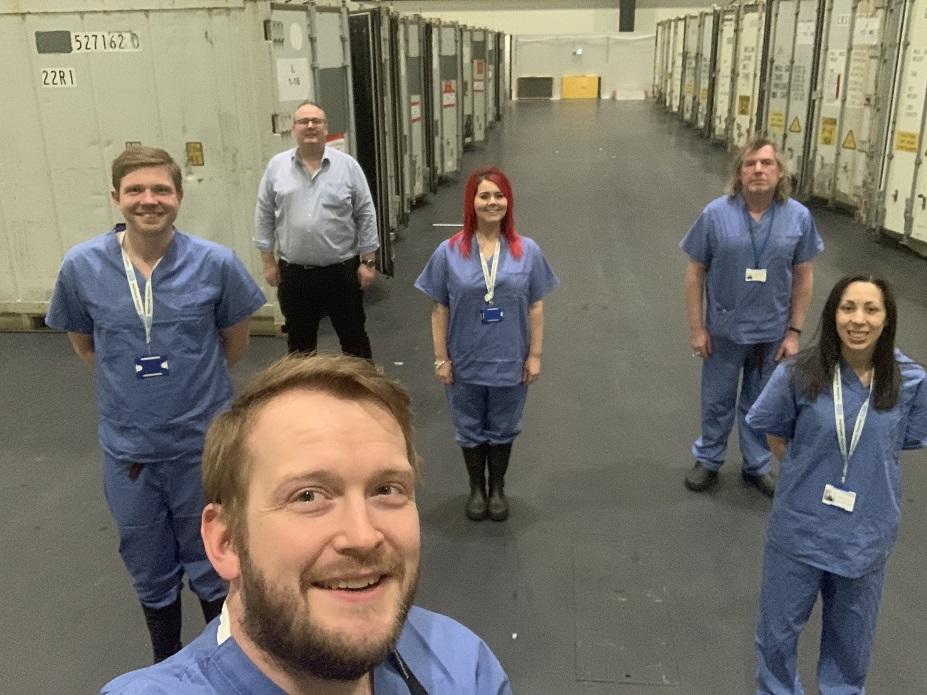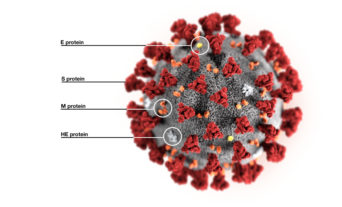‘A human being does not cease to exist at death. It is a change, not destruction, that takes place.’
– Florence Nightingale
It is often forgotten that people who have died need looking after too, but at the Nightingale this had an added dimension of difficulty; deceased patients would be admitted to the mortuary in a body bag, which would not be opened for the duration of their stay and therefore it was imperative to ensure we had all the necessary identifiers to ensure the correct patient was released to the correct family to avoid one of the most serious never events that pathology can encounter.
Equipment and logistic challenges
We needed to ensure there was adequate PPE provision for mortuary staff and satisfactory cleaning of the area to reduce transmission risk. Security was of paramount importance – all doors were key card access only, all lifts were disabled and all potential visual access to the mortuary was removed. An appropriately placed screen ensured privacy of the deceased’s transfer to the funeral directors.
With a predicted maximum capacity of 4,000 inpatients at the hospital, the mortuary would need to be able to cope with potentially receiving 80 deceased patients per day.
There were many other logistical aspects that needed to be considered. Initially, we sourced fridge units that were converted ISO containers with capacity for either 16 or 32 deceased patients, with a total capacity of 1,344. With a predicted maximum capacity of 4,000 inpatients at the hospital, the mortuary would need to be able to cope with potentially receiving 80 deceased patients per day. There were potential challenges with the speed with which funeral directors could collect a patient, since they were working at full capacity with limited storage. Families were likely to encounter further delays in being able to organise funerals during lockdown. We therefore needed the ability to convert the fridges to freezers should a patient be staying with us for 30 days or more.
Following delivery, the fridges needed rapid validation and a temperature monitoring system. A company called Tutela kindly provided their service free of charge with an online system and an alarm to alert if temperature arrears occurred. Resource acquisition, such as body bags, disinfectant, PPE and scrubs, was a major priority but challenging in the face of a national shortage. Setting up an IT service with appropriate access for staff was vital and the mortuary had a specific drive that stored all our processes and a register.

Staffing, SOPs and training
The strong mortuary managerial team needed a large network of staff and a workforce plan was created based on escalating numbers of inpatients to ensure that the mortuary was functioning 24 hours a day. The workforce included mortuary support officers, who were responsible for the receipt of deceased patients into the mortuary and subsequent release to funeral directors, and a team of porters helping with transit from the ward to the mortuary. Much needed staffing support was provided by Team Rubicon, an organisation that has a membership of former military, naval and RAF staff. We would not have been able to function without this amazing team of volunteers.
Identification of the deceased was a major concern and a deceased transfer pack was created to ensure all required information was passed from ward teams to mortuary staff. Several checks were carried out during the transfer process to ensure prompt detection of inaccuracies, and this was supported by a daily mortuary register audit. A series of 16 SOPs were created with associated forms, quick reference guides and risk assessments. This was more than any other department in the hospital and a reflection of the number of processes needed for the efficient functioning of the mortuary. This was underpinned by a training programme for all mortuary staff.

Acquiring an HTA licence
The mortuary was initially set up with no post mortems planned and therefore without a need to acquire an HTA licence. However, it became evident that some cases would need to be discussed with the coroner and transferred within seven days of the referral as required by law. It therefore became apparent that we would need to apply for an HTA licence, which was acquired after modification of a few of our SOPs and providing further risk assessments to meet the expected criteria for compliance.
And finally...
Thankfully, there were fewer admissions to the Nightingale then initially feared – this should be celebrated and not criticised. As we entered May, it became clear that we had passed the peak of the infection, with London intensive treatment units having the capacity to cope with the decreasing numbers of hospital admissions. With the decision taken to go into standby mode (in case of a second peak), we ensured that the deceased in our care were transferred to funeral directors with eventual closure.
People who have died need looking after too, and hopefully we have shown other clinical teams and the general public the vital role and skills that bereavement staff, anatomical pathology technologists, pathologists and all members of the compassionate care team have to help ensure this.
On reflection, this was one of the proudest experiences of my career so far and everyone working within the mortuary learnt a great deal. Showing that a fully functioning HTA-compliant mortuary and associated services can be created in such a short time frame will hopefully be a legacy of the NHS Nightingale mortuary and our team. People who have died need looking after too, and hopefully we have shown other clinical teams and the general public the vital role and skills that bereavement staff, anatomical pathology technologists, pathologists and all members of the compassionate care team have to help ensure this.



